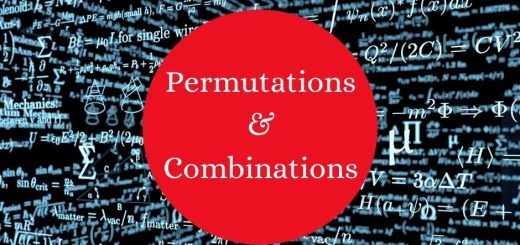GRE Probability Questions: How to Tackle
Have you ever wondered about your ‘probability’ of scoring a perfect 170 in GRE Quants? Well, if you think that a perfect score in Quants is a distant dream; then let me tell you ‘you are wrong’! A perfect score is very much achievable and you don’t have to be a mathematician to do that. You just need to understand the basic concepts on which you are tested; one of those concepts being- ‘probability’.
Introduction to GRE Probability
The Quants section of GRE assesses you across four broad areas- arithmetic, algebra, geometry, and data analysis. Probability is one of the concepts tested in the data analysis section. However, Probability is just a small part of data analysis and you may expect hardly two to three questions on probability.
Now, you might be asking why to study probability if it forms such an insignificant part of GRE Quants? Well, if you are aiming for a high score in the quantitative section and have already mastered the algebra, arithmetic, and geometry; then two or three questions can make a world of difference in your scores. It is therefore important that you familiarize yourself with the basics of probability thereby raising your chances for a higher and a better GRE Quants score.
Download our eBOOK on “5 Techniques to score a perfect 170 in GRE Quant“
Probability questions can take on many different forms such as multiple choice questions, quantitative comparison, and numeric entry. In case of multiple choice questions, you will be asked to select only one answer from a list of five choices. Quantitative comparison questions consist of two quantities, let’s say A and B, which are accompanied by a description. Your task is to compare the quantities and select one of the four possible choices. Numeric entry questions, as the name suggests, ask you to enter your answer either as an integer or as a decimal in an answer box or enter a fraction in two separate boxes.
Concepts tested in GRE Probability
Now that you have a fair idea about the number and kind of questions to expect, let us have a look at the concepts tested by these probability questions. All GRE probability questions will test your knowledge of two basic concepts- simple probability and permutation and combination.
Simple probability:
Probability is a way to describe uncertainty and the possible outcomes of an experiment using numbers. Simple probability determines the likelihood that an event will happen. Let us look at an example to understand simple probability better.
When we perform an experiment, then the set of all the possible outcomes is called the sample space (S). When we roll a die, the possible outcomes are 1, 2, 3, 4, 5, and 6. Here, in our example of rolling a die the sample space is-
S = {1, 2, 3, 4, 5, 6}
Any subset of the sample space is called an event. So, let’s say “rolling an even number” is an event which corresponds to the outcome of {2, 4, 6}. Now, the probability of rolling an even number is the number of outcomes that constitute the event divided by the total number of possible outcomes. We call the outcomes in an event its ‘favourable outcomes’. So, the probability of an event is determined using the following formula-
Probability = Favourable number of events / total number of events
or, P(E) =n(E) / n(S)
Therefore, the probability of getting an even number when we roll a die is-
Probability of getting an even number = {2,4,6} / {1,2,3,4,5,6}
= 3/6
= 1/2
Thus, the probability of getting an even number while rolling a die is half. Or in other words, the probability of getting an even number when we roll a die is fifty percent.
Permutation and combination:
Apart from simple probability, the GRE probability section also tests your knowledge of permutation and combinations. In very simple words, permutation refers to sequences and combination refers to groups. In a sequence order is important. Therefore, permutations are sequences where order is important, whereas in case of combinations, the order is not important. Let us understand both these concepts with the help of an example.
Consider the following question:-
In how many different ways can five people sit in a row?
In this question, we have to arrange five people in a sequence. However, the order is important in solving this problem. Now, for the first spot in the row, we have five people to choose from. As we go down the line, the number of people we have to choose from will decrease by one. Therefore, we have 5 x 4 x 3 x 2 x 1 = 120 ways in which five people can sit in a row.
Now, consider this question:-
Steven drew 13 portraits for his art project. He wants to choose 8 of them for his studio art final. How many different groups of photos are possible?
If you observe carefully, this question asks about groups and not the order in which the portraits will be chosen. Therefore, this is a combination problem. Therefore, using the formula-
nCk = n! / k! * (n–k)!
= 13! / 8! * (13–8)!
= 1287 different groups
Download our eBOOK on “How to Master GRE Probability“
Tips to master GRE Probability questions
Tip 1- Confirm that the question is on probability:
In GRE questions don’t come labeled or tagged as arithmetic or probability. It is therefore important to determine whether the problem involves probability or not. So, look for the word ‘probability’ in the questions. If you cannot find the word ‘probability’ embedded in the question description then look for other important and related key terms such as- event, outcome, random selection.
Consider the following example-
1) A fair dice is tossed. Event A is defined as getting a prime number and event B is defined as getting an even number. Which one of the following is/ are true?
(i) P(B)= 1/2
(ii) P(A n B)= 0
(iii) P(A) + P(B)= 1
(iv) P(A n B)= 1/6
(v) P(A)= 4/6
Notice in this example question that the word probability has not been used. But as you can observe the word event appears in the question. This means that the question involves probability.
Tip 2- Memorize the formulas:
If you want to have a good Quants score then memorizing the key formulas in probability is important. You should not be wasting time trying to figure out what the formula was as you don’t get a lot of time to solve the questions. Our experience with GRE aspirants shows that top scorers actually spend more time learning formulas and concepts rather than practicing sums.
These are some of the important probability formulas you can memorize and keep in handy-
The probability of an event = Favourable number of event number of total outcomes
Odds in favor of an event = Number of favorable outcomesNumber of total outcomes
Odds against an event = Number of unfavorable outcomesNumber of total outcomes
Download our eBOOK on “GRE Math Formula Book for a Perfect 170“
Tip 3- Practice a lot:
There is no shortcut to success. And that is true even for GRE Quants. If you are dreaming of higher Quants score, your dream will come true with thorough practice. Data shows that difficulty level of questions on probability is usually medium to high. So, make sure that you practice GRE questions which are a little tough. You must practice advanced GRE questions of level 4 and level 5.
In order to secure a higher percentile in GRE Quants, it is important that you gain enough understanding of probability concepts. In fact, achieving a perfect 170 in Quants is not a very difficult task. What you need is some advice and guidance regarding how to prepare and avoid some common mistakes that GRE test takers often make. You can check out our video on Quant Shortcuts! (Probability)
We hope this article provided you with smart ways to crack GRE Probability questions. All the best!









